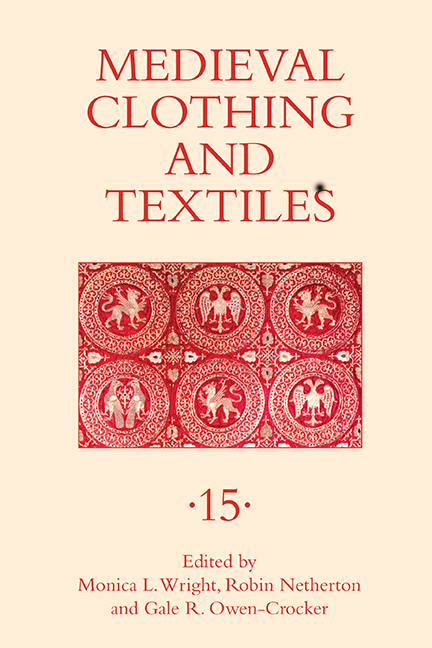Book contents
- Frontmatter
- Contents
- Illustrations
- Tables
- Contributors
- Preface
- 1 Old Rags, New Responses: Medieval Dress and Textiles
- 2 Text/Textile: “Wordweaving” in the Literatures of Anglo-Saxon England
- 3 Unfolding Identities: The Intertextual Roles of Clothing in the Nibelungenlied and Völsunga Saga
- 4 Clothing and Textiles at the Court of King John of England, 1199–1216
- 5 Dressing the Sacred: Medallion Silks and Their Use in Western Medieval Europe
- 6 Habit Envy: Extra-Religious Groups, Attire, and the Search for Legitimation Outside the Institutionalised Religious Orders
- 7 The Loom, the Lady, and Her Family Chapels: Weaving Identity in Late Medieval Art
- Recent Books of Interest
- Contents of Previous Volumes
2 - Text/Textile: “Wordweaving” in the Literatures of Anglo-Saxon England
Published online by Cambridge University Press: 31 March 2021
- Frontmatter
- Contents
- Illustrations
- Tables
- Contributors
- Preface
- 1 Old Rags, New Responses: Medieval Dress and Textiles
- 2 Text/Textile: “Wordweaving” in the Literatures of Anglo-Saxon England
- 3 Unfolding Identities: The Intertextual Roles of Clothing in the Nibelungenlied and Völsunga Saga
- 4 Clothing and Textiles at the Court of King John of England, 1199–1216
- 5 Dressing the Sacred: Medallion Silks and Their Use in Western Medieval Europe
- 6 Habit Envy: Extra-Religious Groups, Attire, and the Search for Legitimation Outside the Institutionalised Religious Orders
- 7 The Loom, the Lady, and Her Family Chapels: Weaving Identity in Late Medieval Art
- Recent Books of Interest
- Contents of Previous Volumes
Summary
The overlapping, metaphorical relationship between text and textile is overt in the Old English and Latin literatures of Anglo-Saxon England, and one metaphor that capitalizes on such a connection is poet or author as “wordweaver.” One hypothesis to explain the metaphor—or rather, cluster of metaphors—in Old English literature is that Anglo-Saxon peoples were aware of the visual and etymological relationship in Latin between words for weaving and writing or composing. That they were clearly influenced by Latin examples of such metaphors is indubitable, and I will examine the metaphor's transmission, and indeed genealogy, through a series of classical and late Latin texts known to have inspired Anglo-Latin texts, the latter of which have a fascinating inter-genealogy of their own. But to consider the connection solely through the lens of Latin source study forecloses other important possibilities. A more significant question is why such a metaphor would resonate sufficiently to take on a rich life of its own in Old English as well as Anglo-Latin literature; indeed, why such a metaphor or group of metaphors would be used to describe not solely Latin composition, but also Old English poetic techniques. Interrogating the resonance of text/textile metaphor allows for far more complex lines of enquiry. What elements of the material culture of textiles among the Anglo-Saxons would make a “wordweaving” metaphor comprehensible and attractive to its authors? What aspects of the composition of Old English poetry would make an original or a translated metaphor seem apt? What characteristics of stylized Anglo-Latin writing—from riddles to saints’ lives and passages of exegesis—would render the metaphor apt for those among the same specialized population of writers working in Anglo-Latin? Building on prior and present research, I will attempt to trace these patterns and relationships across the metaphors of “wordweaving” in the literatures of Anglo-Saxon England.
LATIN WORDPLAY: TEXERE, TEXTUM, AND ORDIOR
Textual-textile metaphors are embedded in the Latin lexicon inherited by the Anglo-Saxons, or at least, by the small but significant portion of the Anglo-Saxon population that was textually as well as orally literate, or perhaps literary.
- Type
- Chapter
- Information
- Medieval Clothing and Textiles 15 , pp. 33 - 52Publisher: Boydell & BrewerPrint publication year: 2019



